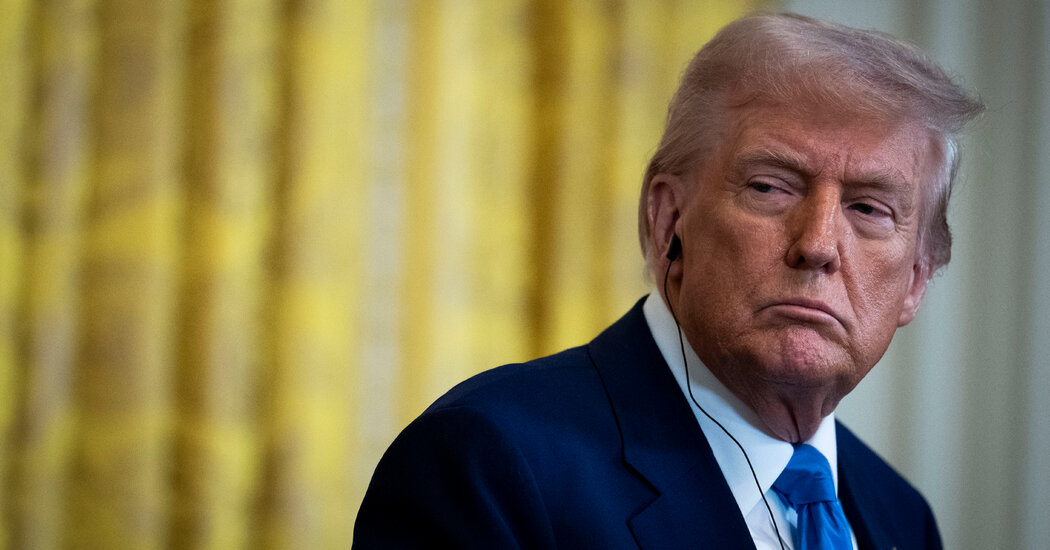The carrot and stick approach
Investors finally seem to be getting the message: Don’t underestimate President Trump’s tariffs threat. The S&P 500 fell on Monday to its lowest level since his inauguration on jitters that a new round of the Trump trade war would kick in next week.
The slump comes even as Trump offered a carrot to corporate America on Monday, insisting that as part of his efforts to help end the Russia-Ukraine war, his administration is already working on deals to gain access to those nations’ valuable natural resources.
Trump said that tariffs on Mexican and Canadian imports “are going forward on time, on schedule,” and would be imposed March 4 (should the countries fail to win themselves another reprieve). “We’ve been taken advantage of,” he reiterated on Monday.
Then tariffs on imported aluminum and steel are set to begin a week later, with reciprocal levies starting in early April.
An accord on getting a cut of Ukraine’s minerals seems close, but hardly certain. One sticking point: The White House appears unwilling to meet demands by Kyiv and its European allies for American security guarantees.
But Kyiv may have won a major concession. The latest deal terms, reviewed by The Times, no longer contained a demand that Ukraine pay as much as $500 billion into a U.S.-controlled fund derived from the future sale of Ukraine’s natural resources, including oil, natural gas and minerals.
Meanwhile, Vladimir Putin opened the door to American companies helping develop mineral resources in Russia, as well as Russian-occupied Ukraine. The Russian president’s message, delivered to state media on Monday, tracked with statements from the Trump administration delegation at last week’s U.S.-Russia talks in Saudi Arabia
Yet despite the “incredible opportunities” promised by Trump, Western companies are unlikely to return to Russia any time soon.
Trump has continued to abandon the Biden-era policy of isolating Moscow. That came into further focus on Monday, on the third anniversary of Russia’s full-scale invasion of Ukraine, when the U.S. joined Iran, North Korea and China in voting against a United Nations measure to condemn the Kremlin for the act.
That drew a rebuke from a Trump ally in Congress, Senator John Curtis of Utah.
-
In other trade news: Bloomberg reported that the Trump administration was seeking to extend export controls of high-end chips to China, bolstering restrictions put in place during the Biden presidency. Shares in Nvidia, the semiconductor giant that reports results on Wednesday, are down in premarket trading.
HERE’S WHAT’S HAPPENING
Starbucks plans to lay off 1,100 corporate workers. The cuts, which amount to about 7 percent of the coffee giant’s nonretail staff, are meant to let the company “operate more efficiently” and “reduce complexity,” according to its C.E.O., Brian Niccol. It’s the latest effort to shake up Starbucks, which has struggled with sagging customer demand.
The Democratic Republic of Congo seeks to curb cobalt exports. The metal’s prices have fallen to their lowest levels in decades and the four-month suspension is intended to prop up prices for the essential component of batteries for electric vehicles and more. The country is the world’s largest exporter of cobalt, but some analysts said the export pause could benefit other producers, including Indonesia.
Lawyers for Paramount and President Trump agree to seek a mediator in their CBS fight. The move, first reported by DealBook’s Lauren Hirsch and The Times’s Ben Mullin, is the latest sign that the two sides are trying to settle Trump’s $20 billion lawsuit on the editing of a “60 Minutes” episode. Many Paramount executives believe that ending the lawsuit could increase the odds that the Trump administration would clear a path for the company’s deal with Skydance.
JPMorgan Chase adds $50 billion to its direct-lending initiative. The financial giant will quintuple the size of its existing efforts, as the private credit industry emerges as an increasingly popular alternative to traditional banking services. Other banks, including Citigroup and Goldman Sachs, have also sought to claim a piece of the direct-lending boom.
From a directive to a “voluntary” request
For now, it looks like Elon Musk has hit a wall when it comes to his latest job-cutting maneuver.
The Trump administration has said that a directive to federal employees to send an email with their most recent work accomplishments was only “voluntary,” and didn’t — for now — put them at risk of being fired.
It’s only one instance of Musk being stymied in his quest to shatter the government status quo. But it suggests that his particular brand of disruption has indeed hit a limit.
Not even President Trump’s sorta-endorsement got people on board. At a meeting with President Emmanuel Macron of France on Monday, Trump not only praised Musk’s directive as “genius” but that those who didn’t respond would be “fired” or at least “semi-fired.”
But the Office of Personnel and Management emailed federal workers to say complying with the email demand was voluntary, and a lack of response wouldn’t be considered a resignation, despite what Musk had warned.
Musk was left to fume on social media. “The email request was utterly trivial, as the standard for passing the test was to type some words and press send!” went one of several X posts by him on the topic. He later wrote, “Subject to the discretion of the President, they will be given another chance. Failure to respond a second time will result in termination.”
What comes next is unclear. The White House press secretary, Karoline Leavitt, insisted that “everyone is working together as one unified team at the direction of President Trump.” Yet many agencies ordered staff members not to respond, with the Energy Department telling workers to also disregard any future such emails.
What was the email demand was meant to accomplish? NBC News reported that Musk’s government team had planned to analyze responses with artificial intelligence to determine whether those workers’ jobs were necessary.
For now, the Office of Personnel and Management isn’t sure what to do with the emailed responses it has already received and has no plans to scrutinize them, according to The Washington Post.
Bigger questions hang over the so-called Department of Government Efficiency. A federal judge on Monday questioned the constitutionality of the Musk-devised effort, in part because a) Musk was neither nominated nor confirmed to lead a federal agency and b) the Trump administration has said that the billionaire isn’t a DOGE employee.
Another federal judge temporarily blocked DOGE from obtaining sensitive information from the Education Department, an organization conservatives dearly want to raze, or the Office of Personnel and Management. And the head of the Office of Special Counsel moved to protect probationary federal workers, calling Musk-led efforts to fire them unlawful.
The takeaway so far: Musk has already done a lot to reshape America’s civil service. But moving fast and breaking things has its limits in Washington.
Art of the deal, according to Tim Cook
Tim Cook may have just shown corporate America how to win over President Trump and excite investors.
Apple’s stock gained on Monday as the rest of the Magnificent 7 fell, after it committed to investing a record sum in the United States, drawing praise from Trump.
Beyond the headlines, the announcement raises some questions: Will Apple’s invest-in-America promise be enough to win it relief from looming tariff threats? And is this the new playbook for business leaders?
A recap: The iPhone giant announced on Monday that it would spend $500 billion and would hire 20,000 U.S. workers during the next four years, including opening a new manufacturing plant in Texas to bolster its artificial intelligence efforts.
Trump liked the news so much he essentially leaked the plans last week in a White House meeting of governors. “I had Tim Cook in the office from Apple. He’s investing hundreds of billions of dollars,” the president said. “I hope I didn’t announce this, but what the hell.”
The stakes are high for Apple — and for China, its chief iPhone manufacturing hub. Trump has hit China with a 10 percent tariff, but has vowed to go as high as 60 percent, a move that could drive up handset prices and dent Apple’s bottom line.
Noting that Trump is a transactional figure, some Apple watchers are now wondering what the company will get in exchange for its $500 billion pledge. At the White House last week, Trump let slip that “they don’t want to pay the tariffs,” presumably referring to Apple. He also wondered aloud if Apple would make good on its investment promise, and David Vogt, an analyst at UBS, told Fortune that the $500 billion sum is “completely unrealistic.”
By the way, Apple has probably already earmarked that $500 billion. And others expect similarly framed corporate announcements to follow.
Cook has carefully cultivated his relationship to Trump, and appears to be deploying the playbook he established back in the president’s first term.
After Trump placed levies on China in 2019, Cook went to the White House in search of an exemption. The president came away impressed from that meeting, and Apple scored some concessions. At the time, Cook pledged a $350 billion investment into the U.S. economy, and the hiring of 20,000 American workers.
This time around, the Apple C.E.O. contributed to Trump’s latest inauguration fund and was given a prime spot at the inaugural last month.
Cook isn’t the only tech chief to court Trump. Masa Son of SoftBank last month gained Trump’s favor after signing on to the president’s signature A.I. project, Stargate. SoftBank saw a nice bump in shares after the announcement.
In Trump’s world, optics go a long way. “It’s really the art of the announcement, not the deal,” argues M.G. Siegler, the tech investor and writer. “Deals can and often do go sideways. But an announcement, those can live forever wrapped in the comfort of hopes and dreams.”
THE SPEED READ
Deals
-
Anthropic is said to be finalizing a $3.5 billion funding round that includes Lightspeed Venture Partners, General Catalyst and Bessemer Venture Partners, valuing the chatbot maker at roughly $61.5 billion. (WSJ)
-
Nvidia sued European Union antitrust regulators, arguing an investigation of its takeover of the A.I. start-up Run:ai exceeded their legal authority. (Reuters)
-
Blackstone agreed to buy Safe Harbor Marinas, which services marinas and yachts, for $5.65 billion. (Bloomberg)
Politics, policy and regulation
-
Dr. Mehmet Oz, President Trump’s pick to oversee Medicare and Medicaid, has built a fortune that touches nearly every corner of health care. (NYT)
-
Germany’s probable new chancellor is reportedly negotiating with lawmakers on as much as $210 billion in defense spending, as President Trump demands Europe step up such expenditures. (Bloomberg)
Best of the rest
We’d like your feedback! Please email thoughts and suggestions to dealbook@nytimes.com.





